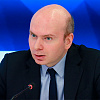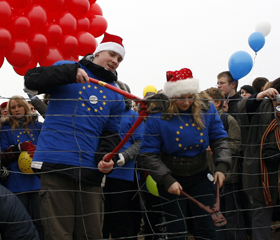The phrase Europe is our common home has been so overused in official speeches that it has become trite, although in recent decades we have witnessed the conscious elimination or the disappearance of numerous barriers that hampered the perception of this commonality. This process has been most vivid within the European Union, while there seems to be nothing to prevent the expansion of the European integration structure elements that make life and work more comfortable and ensure the observance of universal rules and security. This can happen only as a result of the equitable interaction between the EU and its other European partners including Russia, the largest of them. The free movement of people, goods, capital and services is a natural condition of Europe, and guarantees global competiveness, whereas another Iron Curtain – whether it is along the Ukrainian, Belarusian or Russian border – would badly damage any future European space.
Lately, the image of the EU in the international media has not exactly been positive, while endless negotiations on overcoming the economic crisis inspire nothing but gloom about the future of the European integration project. This overall pessimism also affects EU relations with other countries, since neither sufficient finances nor time nor the political will seem to remain to solve these snowballing problems. The EU-Russia dialogue is further aggravated by growing European discontent over Moscow's policies – adding weight to skeptics’ arguments that that the relationship is deteriorating. Some might see it as years of treading water, but it may as well be a steady long-distance run, with a lot of arguments to support this view.
Strategy and Tactics
Vladimir Putin has repeatedly and, apparently quite sincerely supported the establishment of a single common European space stretching from Lisbon to Vladivostok. In fact, the only expert research Putin referred to in his pre-election article on foreign policy priorities was the report Toward the European Alliance by the Valdai Club. The paper elaborated on the strategic dividends in store for Russia and the EU if they join forces, explaining that otherwise Europe would decline due to worsening competition among the world’s major power hubs.
The very idea of a common space was accepted by the EU back in 2003-2005, when the parties first formalized it in a joint statement, and later in the Roadmaps, which are not precise, but can still offer strategic guidance. In 2009, the Roadmaps were given impetus through initiative Partnership for Modernization, whose work plan was quite versatile, including issues far beyond technical substance.
Most noticeable achievements in the strategic planning of a joint Russia-EU future did not come out of the blue. In 2004-2008, Sergey Yastrzhembsky, Special Representative for EU Relations and the relevant department within the Presidential Executive Office was responsible for handling the issue as a presidential priority. The scheme fleshed-out landmark agreements reached at the top level and detailed the coordination of follow-up by the agencies involved. Regrettably, this significant link in the decision-making process was later lost.
In recent years, the European Union has also undergone reform, with the External Action Service established to boost coordination in the EU’s activities toward its partners. The body has been in the process of developing since 2010, and there is little indication of efficiency. Therefore, it still remains to be seen whether the Service is capable of performing a refreshing reset in relations between the EU and Russia.
Money and Energy
In January-September 2012, the EU accounted for 48.8 percent of Russia’s foreign trade turnover, i.e. 52.8% of imports and 41.1 percent of exports, which is almost 1 percent more than in the same period of 2011. As a result, Russia is the second largest importer of EU goods after China, the fourth largest exporter to the EU after the United States, China and Switzerland, and the third largest EU overall trade partner after the United States and China. The EU aggregate investments in Russian economy account for about 80 percent of the total, with almost 40 percent of Russia’s currency reserves denominated in euro, a fact recalled by the Russian Foreign Ministry.
In the Russian market, the EU companies are assisted by the Association of European Businesses, which is quite positive in its assessments of Russia’s economic prospects. For many years, the key complaint about the Russia-EU negotiations among the business community had been Russia’s non-participation in the World Trade Organization (WTO). Since Moscow’s WTO accession was finalized in August 2012, conditions have emerged to boost economic ties on the basis of universal international rules.
It is no secret that Russia’s exports to the EU are largely energy and minerals (82.9 percent in 2011, i.e. one third of overall commodities bought by the EU abroad. Russia is eager to diversify its exports, and the EU would like to diversify its suppliers. But this is an issue for the future, whereas today Russia and the EU are rigidly interdependent in this area, which is of such considerable importance that it cannot be sacrificed on the altar of politics.
At the same time, interdependence does not mean the absence of differences. In the energy sector, the differences lie primarily in the parties’ views on the effects of the Third Package of EU legislation currently in force, which aims to de-monopolize commercial relations. Moscow believes that the new rules would just add intermediaries and raise prices, and in any case is willing to see the current contracts exempted from the Third Package. Brussels would like to move toward the WTO-Plus regime, which is greeted with caution in Moscow, as it wants to fully assess the effects of the initial agreements for WTO participation.
WTO-Plus is open to very broad interpretation, with the provisions dealing with optimizing business set to be beneficial for both sides in the long run. No doubt, energy companies, including Russian ones, will get used to the Third Package and, later, to the Fourth Package. If at least some of Moscow's concerns are heard by Brussels, this process of adaptation will go faster.
Visa Issues
Russians enjoy traveling to the European Union, with 14 out of the 20 countries they visit most being within the EU, although Finland and Estonia are most popular, primarily for Russians from adjacent territories. The reason for this is in the virtually indisputable fact that Russia is, in cultural terms, European – there are close cultural and historical ties between Russia and Europe. Although trips like this would have seemed impossible just a generation ago, today they are a reality – despite the visa regime, the only remaining barrier to free travel.
The visa dialog was analyzed in detail in a RIAC commentary last February. It took Russia and the EU a year to implement joint steps to switch to a visa-free regime that involved the parallel preparation of an agreement governing the further facilitation of visa procedures. The work on these joint steps will continue, tentatively, through to the end of 2013. A modest agreement on easing the visa process was to be signed in late 2012, but the sides failed to come to terms on the visa-free access for service passport holders that the Russian negotiators wanted. The absence of such an accord could create problems for civil aviation pilots from EU countries that lack the relevant bilateral agreements with Moscow, who would therefore have to obtain visas for flying to Russia.
Notably, Moscow's position drew harsh criticism from the Russian media, which regarded the service-passport provision as an attempt to expand bureaucrats' privileges and make them immune from blacklisting. This approach seems ungrounded, as no-visa entry for service passports is the logical first step toward a full-fledged visa-free regime. This measure would test the control mechanisms and alleviate certain EU countries’ concerns, which are essentially built on prejudice. At the same time, every state would preserve the right to refuse entry to a foreigner as set out in its law.
Crises and Peacemaking
There are still numerous issues of concern for both Russia and the European Union. Moscow already had to assist Brussels in relief operations in Chad and the Central African Republic in 2008-2009 by providing helicopter support to the EU military forces protecting the Darfur refugees. The future will likely see further coordination in counteracting piracy, drug threats and terrorism, as well as in the prompt deployment of peacemaking missions. The nonproliferation of WMD and preventing a disaster of global proportions should also be discussed and handled jointly by Russia, the EU and other international actors. Work in this area is underway but is less than efficient, as it requires an adequate institutional basis.
More and more countries, including the United States and Canada, are entering into cooperation agreements with the EU on crisis management, while similar talks with Russia run for years without any result. Moscow insists on reciprocal operational participation, despite the fact that, in the EU, supranational operational structures merely coordinate the forces supplied by member-countries. Accordingly, there should be bilateral agreements between Russia and the EU states regarding their participation in Russian operations, but not about reciprocal coordination center subordination.
However, the equitability issue seems more relevant in another context. Joint EU-Russia decision-making, could seem quite reasonable, provided that an appropriate agency and political will are both present. The establishment of the Russia-EU committee on foreign policy and security was proposed in the 2010 memorandum that followed the Medvedev-Merkel summit in Meseberg. The EU countries are still negotiating the initiative. But as soon as the sides decide in principle to raise the level of Russia-EU operative interaction, the creation of a relevant structure will become a must.
Going Further
Differences may remain on the agenda for a long time, but they will be surmountable provided the partners are ready to meet halfway. However, this logical and seemingly only choice is not painless, since the sides are riddled with mutual suspicions and prejudice. Due to election cycles, the discussion of what the future Russian political system will look like is in full swing both in Russia and in the EU. There is also a lot of controversy about the European post-crisis development. But crises do end, and usually produce openings for further development, with Russia and the EU not likely to make an exception.
For the European Union, the decades-long leader in science, technology and societal organization, this crisis provides an opportunity to realize the threat of lagging behind if it fails to make controls more flexible and efficient and also fails to fully employ private initiative in previously government-dominated areas. This means modernization, a challenge Russia also faces.
With Russian democracy advancing, the current disputes on differences in values and democratic standards will diminish. The coming generations of Russians and Europeans will be free of these Cold War stereotypes and are sure to demand equally high standards of living and work irrespective where their skills are needed, be it Lisbon, Paris, Tyumen or Vladivostok.
New conditions and new opportunities for cooperation will emerge, bringing with them common rules governing economic activity, at first simpler visa procedures – and a little later the scrapping of all visa requirements, so that targeted diplomatic efforts can make the common European space a reality.








